
Morton Blackwell
December 18, 2015
Picking a Presidential Nominee in 2016
The presidential nomination process is about to enter a very different phase. Until now, the 2016 presidential campaign has consisted mainly of words: speeches, debates, interviews, and the publication of some issue papers by the candidates. The coming contests in the states will actually elect delegates, and this race will become a test of each candidate's ability to identify supporters and organize them to participate personally in the primaries and conventions.Every state and U.S. territory has different election laws and party rules, not to mention different sets of political circumstances and local leaders. Organizing successfully to win nomination contests in enough states and territories to win a national presidential nomination is a massive problem. Some candidates will not come close to solving it.Conservatives are keenly aware of the fact that, among the several presidential candidates the Republican Party has nominated since Ronald Reagan, not one of them supported Reagan for nomination in 1980. If they can, conservatives should nominate in 2016 a candidate as genuinely committed to conservative principles as Reagan was. Several candidates now running appear to be more conservative than anyone Republicans have nominated for President since Reagan. Conservatives hope they can unite behind a single candidate, but they haven't yet come close to uniting. Can they achieve this and win the nomination and the general election?I think they can.First, almost every conservative leader I know, even those who have already endorsed a Republican candidate, will admit that there are several among the current field of candidates whom they would happily support in the November 2016 election. Their current preferences are at least somewhat fluid.Second, a great many conservative activists and leaders now have no single preference. If asked, they will list a number of candidates whom they believe are reliably conservative and infinitely preferable to the Democrats' likely nominee.As the contest enters the phase where grassroots organization and activism will determine who wins how many delegate votes at the Republican National Convention, serious conservative activists and leaders will have to decide for sure whom they choose to support. If enough of them choose the same candidate, that candidate will win the presidential nomination.That important decision will determine the future of our country.I know almost all of the presidential candidates, and some of them have been personal friends and allies of mine for years in the public policy process. Put me personally among the undecided in this contest.To help me think through this, I'm writing this brief discussion of what I believe to be the most important factors to take into consideration, and then I'll share it with conservatives whom I hope may find my thoughts useful in their decision-making process.Has the candidate a record of personal activism and leadership for conservative principles?Talk is cheap. Actions have consequences. Every experienced conservative has heard many candidates make false promises to appear more conservative than he or she has ever been. Past performance does not necessarily predict future results, but it usually is the best indicator.Is the candidate surrounded by people notable for their firm commitment to conservative principles?Personnel is policy. Long before he became President, Ronald Reagan had surrounded himself with competent and serious conservatives who were known and trusted by movement conservatives. If elected, a candidate without an inner circle of reliable conservatives to help him or her staff an administration has no chance of winning victories in tough battles against liberals. And conservatives should not forget that one more reliably leftist presidential appointment to the Supreme Court could irreparably damage America.Are the candidate's currently stated policy positions solidly conservative?Quite often candidates, if elected, turn out to be less conservative than they promised to be in their election campaigns. Very rarely does an elected official turn out to be a better conservative than he or she led conservatives to believe. If a candidate currently advocates some liberal positions, the chances are almost zero that he or she will ever fight hard against the liberals on many issues.Has the candidate ever continued to fight hard for conservative principles when it appeared to be a losing battle?Never fully trust anyone who has not knowingly gone down fighting for an important, good cause that he or she believed was losing. Sometimes we have to live with content-free Republicans, but conservatives should not promote any of them to the White House.Does the candidate frequently reverse his or her positions on important issues?Every major politician, including the most admirable among them, occasionally changes position on at least a few issues, but a candidate who frequently flip-flops on policy issues for personal political advantage cannot be trusted to keep even promises solemnly made.Has the candidate built a record of helping conservative organizations and working to elect conservative candidates?The fight for conservative principles cannot be won without strong conservative organizations to pressure politicians and without conservative election victories, including in nomination contests with non-conservatives. A candidate who has never helped conservative organizations or conservative candidates cannot be expected to change that behavior if elected.If elected, would the candidate melt when the heat is on?Our country is in deep trouble. Most Americans believe the U.S. is headed in the wrong direction. Only strong, principled leadership can enable us to recover from the damage already done. Business as usual would make our major problems worse. Conservatives should consider candidates' strength of character.Assume that Republicans elect a President in 2016 and keep Republican majorities in both Houses of Congress. How will the left react if a new President starts the difficult task of repairing damage the left has already done? For example, what if legislation were passed to cut significantly our currently bloated government spending?Leftist organizations now receive billions of dollars each year from government funds. For them, most government spending, except for defense spending, is virtually sacred. And left-wing groups are larger and better organized than ever before in our history. They would surely react immediately to any real threat to cut the cost and intrusiveness of government.I expect that the left would take violently to the streets and create as much ugly chaos as they could. The liberal media would work overtime to blame conservatives.What would conservatives have accomplished if Republicans nominated and elected a President without the strength of character required to persevere for the good of the country under difficult circumstances? Can the liberal media destroy any truly conservative presidential candidate?They'll try, but they have much less of a communications monopoly now than they had when they savagely but unsuccessfully attacked candidate Ronald Reagan in 1980.In the current run-up to the 2016 presidential primary season, the liberals have already fired their big guns to little effect against all the Republicans who now appear to be strong candidates. Most often those attacks have not weakened the targets' support. Some media attacks have actually helped those the liberal media intended to destroy. Polls now show that any of half a dozen Republican candidates could beat the likely Democrat nominee. If enough conservatives unite, they can nominate and elect any of the more conservative Republican presidential candidates. So there's every reason for conservatives to try hard now to unite in support of a candidate they believe would be the most determined and effective conservative President possible.>
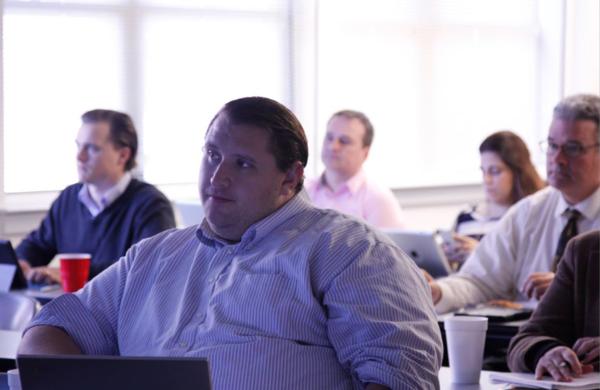
Angel Chitnatham
December 14, 2015
Hoosiers take on a Race for Congress
Even campaigners with years of experience can stand to learn from the Leadership Institute. Earlier this month, Jadan Horyn participated in the Leadership Institute's Campaign Management School and came away with enough knowledge to give an edge to his congressional campaign. Jadan is currently the campaign manager for Jim Pfaff, a candidate running in Indiana's 9th Congressional District. “It all started when I was 13 years old,” said Jadan. “During the Bush/Gore 2000 election, I stayed up all night to watch election results. Pretty much from then on, I was fully enveloped in politics.” A 2012 graduate of Liberty University, Jadan dedicated years to build up his College Republicans group; work with the State Central Committee, the governing body of the Republican Party of Virginia; and serve on the College Republican state board. Jadan would go on to co-host his own talk show called “Rude Awakening” at Liberty University, hosting guests like Senator John McCain and Governor Mike Huckabee. After graduating, Jadan integrated his media background and his interest in political campaigns working for Laura Ingraham on her FOX News appearances, followed by three years of working in congressional communications. It wasn't until he started working in Congressman Tim Huelskamp's office did he meet Jim Pfaff, then Chief of Staff for Congressman Huelskamp. Jim Pfaff would then ask Jadan to be his campaign manager in his race for congress in his home state of Indiana. “I told him I'd take the job but that I needed to go to LI to fill in the missing pieces.” said Jadan. The week-long Campaign Management School provides the students with a run-through on the know-how and tools required to establish and build up their campaigns. “First day, we learned opposition research. It was the how, the methodology, was what I didn't know.” On the first day at the training, Jadan texted his staff how and where to look for the potential weaknesses of their opponent. “By 4:00 p.m. that day, I had an entire document from my campaign researcher about questionable votes made by our opponent. If I had never come to this training, I would have never had that ammunition to use on them.” When asked what advice he would give future candidates and campaign managers now that he's completed the Campaign Management School, he said “Sit them down and hold them accountable….and make sure they follow through on their goals.” Join the Leadership Institute in thanking Jadan for his dedication to conservative principles and congratulate him for receiving LI's Conservative Leader-In-Training Award. To nominate a Leadership Institute graduate or faculty member for the Conservative Leader Award or Conservative Leader-In-Training Award, please contact LI's Director of External Affairs Carol Wehe, at Carol@LeadershipInstitute.org. The Leadership Institute offers over 44 types of training programs, working with more than 1,761 conservative student groups, and helping employers connect with conservative jobseekers. Since the Institute's 1979 founding, LI has trained more than 170,266 conservative activists, students, and leaders. Graduates include members of Congress, state legislators, local officials, media personalities, and conservative organization leaders. For more information, please visit: www.LeadershipInstitute.org.
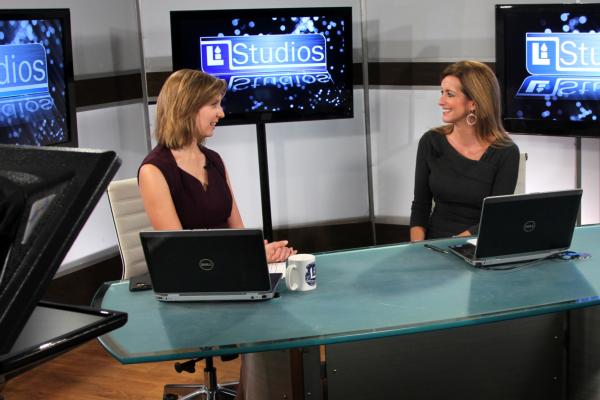
Kyle Baccei
November 24, 2015
The Science of Fascination
Last Wednesday the Leadership Institute hosted its biweekly webinar and the topic was fascinating. Peggy Grande visited LI studios to discuss the science of fascination during the free live webinar Lead, Live, and Be Fascinating.Peggy had the opportunity to work with one of the most fascinating individuals in history -- Ronald Reagan. She began the webinar discussing how her work with Reagan shaped her perspective on the science of fascination. What made him uniquely fascinating and why are we still analyzing his life and leadership? What can we learn from his life that we can apply to our own?Peggy answered these questions and offered insight into this iconic leader. She told us about the secrets to his effectiveness. How the life and presidency of Ronald Reagan can guide you and I toward greater personal success and shapes us professionally to be our best self.President Reagan was truly a fascinating man, and the lessons you and I can learn from his unique personality certainly make us better people.But still, I wondered, what makes me the most fascinating person? Sure, Ronald Reagan was fascinating and how he used his natural qualities to his advantage was great. But, how do I do this? What makes me different and how do they make me the most valuable to others? Peggy had the answer. Whether you are looking for a new job, moving up in your current career, or changing careers, it is essential to know how you uniquelyadd value. Trying to be “better” or “more” rarely works because it is subjective and constantly changing. Instead, she suggests you find out what makes you different and then you should become more of that. This was truly a fascinating webinar. Learning what makes each of us different, and then using that as an advantage, makes us unique in the work place. To hear Peggy talk about the science of fascination click here. It will be fascinating, I promise.For more information on webinars email Carol@LeadershipInstitute, or check out LI's training calendar to find the next live webinar.The Leadership Institute offers over 44 types of training programs, working with more than 1,582 conservative student groups, and helping employers connect with conservative jobseekers. Since the Institute's 1979 founding, LI has trained more than 170,116 conservative activists, students, and leaders. Graduates include members of Congress, state legislators, local officials, media personalities, and conservative organization leaders. For more information, please visit: www.LeadershipInstitute.org.>
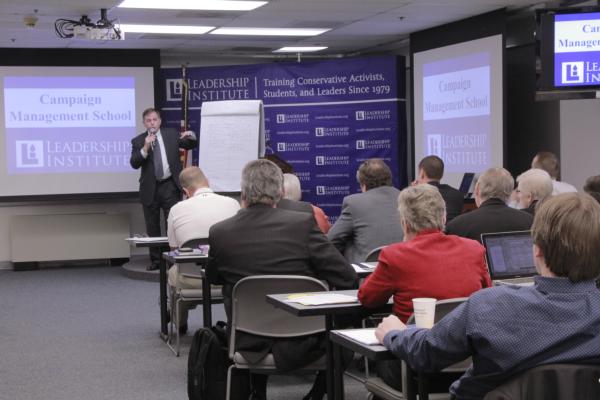
Thomas Bingham and Angel Chitnatham
November 19, 2015
Launch into 2016 as a Campaign Manager
This has been another good year for conservatives who took Leadership Institute (LI) training. In 2015 alone, 161 conservative activists took a Campaign Management School. These graduates are people looking to get involved in their community. They want to be leaders and make changes to their cities, counties, and states by winning elections -- for conservative principles.After hours of lectures, these graduates left with the ability to organize a campaign -- from the moment the campaign begins to Election Day. Better yet, LI grads learned what they have to do from day one to win and affect the public policy process.“I will be forever grateful for the knowledge and specialized training I have received at the Leadership Institute. LI is at the forefront of the current conservative revolution and I am proud to be a part of it,” said Florida resident James White, a recent Campaign Management School graduate.Tori Whiting of Michigan said the March training was “a great way to get conclusive and in-depth training on campaigning.” Ron Ferguson of Ohio said his June participation in LI's Campaign Management School was “the launching pad to being prepared for a campaign."These graduates understand in order to win being trained by the experts is the key to success. But 2015 isn't over yet. There is one last chance to attend a Campaign Management school in 2015.There is still time to join these graduates and get prepared for your next campaign.Mistakes happen, but Leadership Institute graduates know how to respond because they have training. They know how to have an effective strategy. The Campaign Management School teaches just that. And regardless of your political experience, the expert faculty will get you ready for day one of your next campaign.Each training day brings on a new lesson plan that will equip you with the basics to achieve success.Day 1: “Develop a winning campaign plan and strategy”Day 2: “Target and identify your voters effectively”Day 3: “Learn how to raise funds for your cause” Day 4: “Develop effective ads and protect your candidate's image”Join LI next month at the Campaign Management School, December 1st through December 4th and learn how to run your own campaign big or small. End the 2015 season with some inspiration and the know-how to take your race to the next level.Email Angel at AChitnatham@Leadeshipinstitute.org for more information on the training or register for the December Campaign Management School here.The Leadership Institute offers over 44 types of training programs, working with more than 1,582 conservative student groups, and helping employers connect with conservative jobseekers. Since the Institute's 1979 founding, LI has trained more than 165,206 conservative activists, students, and leaders. Graduates include members of Congress, state legislators, local officials, media personalities, and conservative organization leaders. For more information, please visit: www.LeadershipInstitute.org.>

Kyle Baccei and Emily Larsen
November 16, 2015
Student Activist Sues School for Refusing to Recognize Conservative Group
Administrators often hide behind the veil of bureaucracy to justify censorship of conservative voices on campus. Moriah DeMartino experienced this firsthand when she attempted to start a conservative club at Hagerstown Community College.The administration refused to recognize her club because it would duplicate the purpose of the political science club -- even though the administration recognized multiple liberal groups with similar missions.Moriah was then told said she could only start a Republican Club if a Democrat Club was started at the same time. When Moriah petitioned on campus to reverse the decision, campus police confronted her and told her to stop.Now, Hagerstown is facing a lawsuit for denying free speech rights. Sometimes the best way to get your university's attention is to sue your university, and protect the rights of other conservative students in the future.Report liberal bias and abuse on your campus and read more about this story at CampusReform.org.>
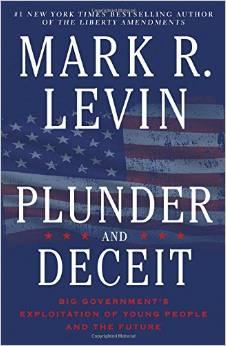
Morton Blackwell
July 31, 2015
A Must Read: Mark Levin’s New Book Plunder and Deceit
In politics, it is not enough to know what's right. To succeed, your command of a subject must be so secure that you can persuade people you are right. And then you must activate them. Plunder and Deceit by Mark Levin is a necessary read for anyone who fights against statist power grabs. This new book sets the stage for the 2016 election and beyond. Levin's new book is a wake-up call, especially for young people. He explains the dangers of government and the coming crisis our country faces -- the loss of the greatest republic known to history. Before the 2016 election, educate your friends and family with this book about the growing dangers of big government. Young people must find the personal strength and will to break through the cycle of manipulation, unrelenting emotional overtures, and pressures of groupthink. Parents too often ignore the threats to their children's future. Plunder and Deceit calls for a new civil rights movement to end the exploitation of our children by statist government policies. Levin challenges young people to stand in their own defense so their generation and future generations can live in freedom. Plunder and Deceit will be released on August 4. However, you can pre-order this book today. Pre-order your copy of this must read, Plunder and Deceit by Mark Levin, today. I recommend Plunder and Deceit to every conservative activist and leader. Mark Levin is a nationally syndicated talk-radio host and president of Landmark Legal Foundation. He is the author of Liberty and Tyranny, the 38-week New York Times bestseller which spent three months at #1 and sold more than one million copies. I expect Plunder and Deceit to be widely read and distributed to young conservative activists and their parents. Activism without education in conservative principles is dangerous. Order your copy of Plunder and Deceit today.
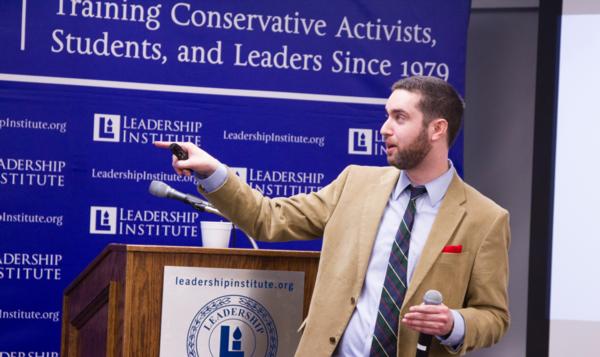
Kyle Baccei and Carol Wehe
July 10, 2015
LI’s Future Candidate School Trains Emerging Conservative Candidates
You don't have to be seasoned politician to win. With proper training and a plan in place, anyone can learn the tools to win.Most beginners struggle with the basics and make common mistakes. There are ways to avoid these mistakes, but it takes learning from the veterans who have been through it all before. It takes training.Bill Taylor has been a South Carolina State Representative since 2010 and credits Leadership Institute's (LI) training for his campaign success. “I defeated the eight-year incumbent 57% to 43%,” Bill said. “My campaign success was fueled by enrolling in LI's Future Candidate School. It was a most valuable experience. LI smoothed our political road to success.”In April 2015, LI trained 48 attendees from 17 states and Canada at the Future Candidate School. They learned from veteran candidates and campaigners how to put together a future campaign and win.Douglas Arnold of Maryland said the April training taught him “excellent essential information for creating a winning campaign theme and strategy.”Past graduates of the Future Candidate School have gone on to win their elections.“This was my first time running for office, and it was against a political veteran,” said New Mexico State Representative Alonzo Baldonado. “It was a tough race, but LI gave me the education needed to run a successful campaign.”The school also trains attendees how to define and polish their message, build strong grassroots support, raise funds, and develop the attributes of effective candidates. Theresa, another attendee of LI's April Future Candidate School said, “I wish I could teleport the people in my area down here for these classes so they could stop blaming each other for conservative losses, and actually know how to start running winning campaigns. #winningby workingtogether” Each day of the Future Candidate School features one of Morton Blackwell's Laws of the Public Policy Process. Day 1: “Sound doctrine is sound politics.”Successful candidates must define themselves to the public before their opponents do, so attendees learn to develop and effectively communicate an engaging message.Day 2: “Build a secure home base.”The second day of training teaches future candidates how to join coalitions and build organizations. Each attendee learns the basics of building contact networks, working with existing factions, and starting new groups.Day 3: “You can't save the world if you can't pay the rent.”To survive, a campaign must be funded. On the third day, attendees learn the techniques of effective fundraising. Fundraisers from around the movement come together to show candidates how to put together successful fundraising events and persuade high dollar donors to fund your campaign.Day 4: “Personnel is policy.”A campaign is only as good as the people it hires. In order to form the right team, you have to understand what kind of personnel you should have around you, and the structure the campaign will have in order to win. The school puts together those pieces for candidates and shows them the best way to organize a campaign.The Real Nature of Politics states, “Being right, in the sense of correct, is not sufficient to win. The winner in a political contest is determined over time by the number and effectiveness of activists on the respective sides.” Leadership Institute graduates know how to win.You can become a Leadership Institute graduate. There's another chance to learn how to become a successful future candidate at LI's last Future Candidate School of 2015, and also learn how to run a winning campaign at the Campaign Management School.Before you even start putting your campaign together, you have to ask yourself, should you be a candidate? Some candidates get into the race without answering this question and are blindsided. Capitol Hill veteran Steven Sutton addresses this question every year with activists who want to get more involved in politics. On Tuesday, July 14, 2015, Steven discusses what it takes to run for office during LI's FREE live webinar, fittingly titled Should You Be a Future Candidate? Watch the webinar here.The Leadership Institute offers over 44 types of training programs, working with more than 1,582 conservative student groups, and helping employers connect with conservative jobseekers. Since the Institute's 1979 founding, LI has trained more than 165,206 conservative activists, students, and leaders. Graduates include members of Congress, state legislators, local officials, media personalities, and conservative organization leaders. For more information, please visit: www.LeadershipInstitute.org.>

Danielle Saul and Stephen Rowe
July 7, 2015
LI’s Sacher Multimedia Center Gets a Makeover
For more than 15 years, the Leadership Institute's Sacher Multimedia Center has been a resource for the conservative movement.In 2015, the studio team upgraded the space to include a brand new studio classroom and lobby. The Sacher Multimedia Center now features the Norma Zimdahl Master Studio, a control room, a dedicated edit suite, and the new multi-purpose James Fishback Boreham Studio Classroom.During Construction New Studios and Classroom This new state of the art technology will allow more media trainings to take place than ever before. Attendees of this training receive expert feedback from a media coach to tailor their message before going on television.Live from LI's studio, Leadership Institute's Campus Reform team regularly reports on liberal abuses and bias on college campuses as guests on national news networks.In the same studios, LI's campus programs staff create engaging videos for college students to learn the skills to become activists on their campuses.The Sacher Multimedia Center even offers a FREE live webinar series which empowers conservative activists to take action in their communities.All of this is possible thanks to the support of the Leadership Institute's generous donors.Find out how the Leadership Institute's Studios can help you! Contact LI Director of Studios Aaron Reese. The Leadership Institute offers over 44 types of training programs, working with more than 1,581 conservative student groups, and helping employers connect with conservative jobseekers. Since the Institute's 1979 founding, LI has trained more than 165,050 conservative activists, students, and leaders. Graduates include members of Congress, state legislators, local officials, media personalities, and conservative organization leaders. For more information, please visit: www.LeadershipInstitute.org.>

Jacob Weaver
July 2, 2015
Fighting for the Farm
How did a small family-farmer transform into a national headline? Why did she join the 2015 Congressional Property Rights Caucus Roundtable, and become The Property Rights Foundation of America's “Nation's Grassroots Property Rights Leader”? It started with a young girl's childhood dream. Martha Boneta grew up in Mount Vernon, Virginia. She attended George Mason University for both her undergraduate and law degree, later studying Alternative Dispute Resolution at the prestigious Strauss Institute of Pepperdine University. After school, Martha worked in government relations at ICS, then became a strategic account executive at Reed Elsevier. Martha's childhood dream became a reality when she purchased Liberty Farm. Unfortunately, her American Dream quickly deteriorated into an American nightmare. Her farm became the epicenter of attacks from extreme environmental groups. Using agencies ranging from the Virginia Department of Transportation to Animal Control, these groups subjected Martha to many abusive inspections. This exploitation culminated in zoning violation charges for the farm's hay rides, birthday parties, on-site sale of farm goods, and pumpkin carving in the pumpkin patch. The penalty? A $15,000 per day fine if she did not immediately cease all operations. “The experience was crushing, and I was heartbroken,” Martha said. Refusing to endure this violation of their property, Martha and her family began to fight back. Agreeing with George Washington, she believed that “freedom rests on the shoulders of property rights.” Martha proceeded to attend three Leadership Institute (LI) trainings -- the Future Candidate School, the Crisis Communication Training, and the Public Speaking Workshop -- where she learned the valuable grassroots skills to combat overbearing government. “The Leadership Institute was able to provide significant insight into overcoming obstacles and having the courage and network of resources available to create coalitions and legislation,” Martha said. The strength of these bipartisan coalitions devastated the liberal opposition. More than “7,000 Virginians wrote petition letters, made phone calls, and attended rallies and General Assembly hearings in support of legislation to protect family farmers,” Martha said. This activism led to the passage of the Boneta Bill I and II, which limited government's ability to overregulate small farmers, allowed farmers to engage in on-farm activity to attract customers, and provided consumers better access to locally produced farm goods. The new documentary Farming in Fear produced by Sean Malone of Honest Enterprise depicts Martha's nine-year battle to save her livelihood. The film premiers at the Anthem Film Festival on July 11. When asked about the film, Martha responded: The message people walk away with is hope. The idea that even though government and powerful special interests so often seem unbeatable, and that it's pointless to even try to defend your rights against those kinds of odds, it is actually possible to succeed if you persevere and stand strong for truth, justice, and the American Dream. Martha also plans to speak at the 44th National Fourth of July Conservative Soiree hosted at Bull Run Park (Centreville, VA) from 11 a.m. to 3 p.m. All who attend receive free admittance to the food, the fun, and the great company of other conservatives! Though the fight for her farm ended, Martha knows she must continue to promote freedom, declaring: My heart will always be on the farm, but I have a great passion for community engagement and grassroots organization. If we are not zealously and passionately protecting our freedom, we will no longer be free. This experience has taught me to never, ever give up on the American Dream. It is my hope and prayer that others will be inspired by my family's journey to stand strong to keep the flame of liberty burning bright. The Leadership Institute thanks Martha for her dedication to conservative principles and congratulates her for receiving LI's Conservative Leader Award. To nominate a Leadership Institute graduate or faculty member for the Conservative Leader Award or Conservative Leader-In-Training Award, please contact LI's Director of External Affairs Carol Wehe, at Carol@LeadershipInstitute.org. The Leadership Institute offers over 44 types of training programs, working with more than 1,581 conservative student groups, and helping employers connect with conservative jobseekers. Since the Institute's 1979 founding, LI has trained more than 165,050 conservative activists, students, and leaders. Graduates include members of Congress, state legislators, local officials, media personalities, and conservative organization leaders. For more information, please visit: www.LeadershipInstitute.org.
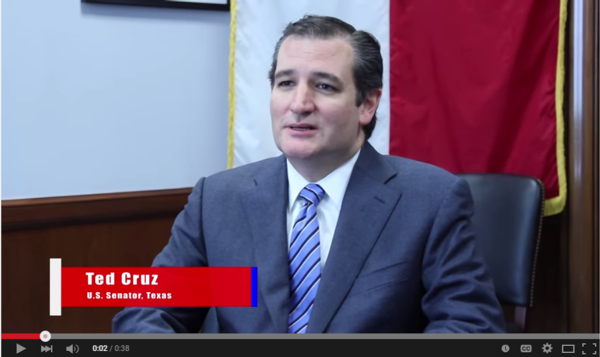
Jacob Weaver and Joshua Gill
June 18, 2015
Sen. Cruz About LI: “A Training Ground for the Conservative Movement”
“The Leadership Institute is a training ground for the conservative movement,” Texas Senator Ted Cruz said. Watch Senator Cruz in this 38 second YouTube video. “LI does a fantastic job taking young conservatives from all across the county and helping give them the tools to defend free market principles, to defend the constitution, and to explain the principles our country was founded upon,” Senator Cruz said. The words of Senator Ted Cruz express the Leadership Institute's (LI) fundamental mission: to increase the number and effectiveness of conservative activists and leaders in the public policy process. By equipping the conservative movement with the proper political tools and technology, LI builds the foundation for future conservative success. The Leadership Institute develops this foundation on a network of individuals, offering forty-four different trainings which target everyone from grassroots activists to future politicians. Former Senator and current President of The Heritage Foundation, Jim DeMint explained LI's influence: I come across the Leadership Institute's graduates all the time… as key congressional staffers, as heads of conservative organizations, even as colleagues. When I ran for U.S. Senate in 2004, an LI graduate was my campaign manager and another organized students for me throughout South Carolina. Even my son-in-law is a Leadership Institute graduate. Leadership Institute graduates continue to make a difference in the public policy process not only around the United States, but around the world. In 2014 alone, LI trained 7,805 students within the U.S. and another 10,377 internationally. In addition to on-sight and grassroots trainings, the Leadership Institute brings conservative courses to the digital age, broadcasting live webinars from LI Studios. The free online programs allow anyone instant access to a small part of the trainings LI offers. The Leadership Institute, Sen. Ted Cruz said, “is setting the foundation for what I believe is a historic opportunity we have to turn our country around -- to get back to the principles America was founded on.” Join the movement. Find out more at www.leadershipinstitute.org.
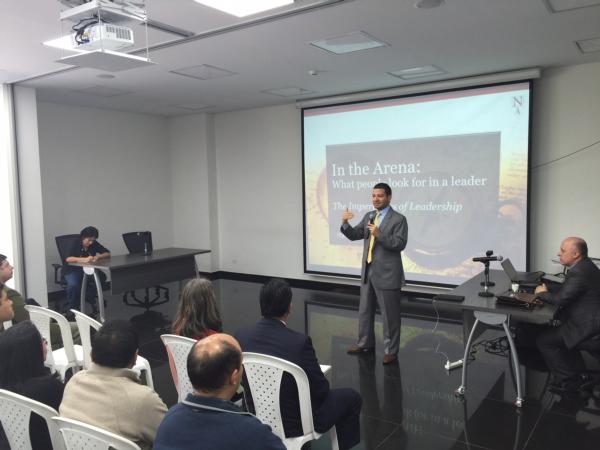
Ron Nehring, Director of International Programs
June 17, 2015
Grinding up bad laws: LI Faculty Member Italo Antoniotti fighting for free market reforms in Latin America's coffee sector
It's been said that big business loves big government, and this maxim certainly holds true in Latin America where Leadership Institute faculty member Italo Antoniotti is fighting to reform Guatemala's outdated and destructive coffee and trade laws -- helping tens of thousand of indigenous Mayans in the process. Antoniotti serves as the director of FEDECOCAGUA, the voluntary national association representing 23,000 small coffee producers in Guatemala, most of whom are native Mayans. They're going up against the country's biggest coffee producers and their government-guaranteed supermajority on the board of Guatemala's state-sanctioned coffee trade association, ANACAFE. The small producers represented by Antoniotti's group are forced to obtain export licenses from the big coffee producers that dominate ANACAFE, and pay a mandatory (and economically inefficient) 1% export tax to fund the organization. This year, FEDECOCAGUA went to court to challenge the constitutionality of the export tax and the regulatory system that requires small coffee producers to, in effect, obtain the permission of their larger competitors for the freedom to sell their goods on the world market. With a tiny domestic coffee market, producers' financial success or failure depends entirely on their freedom to export. With a 30% decline in Guatemala's coffee production during the last decade, it's economic crunch time for the country's indigenous population of coffee producers who rely on selling their product to sustain their families and communities. Antoniotti, who began serving as a Leadership Institute volunteer expert faculty member in Latin America this year, argues that the free market, and not government mandates, should prevail. Industry trade associations should be voluntary and not government-mandated, and the export tax should be abolished as economists universally recognize the inherently destructive nature of export taxes. (Article 1, Section 9 of the United States Constitution explicitly prohibits such taxes.) In many Central American countries people have been forced to choose between socialist policies on the one side, the crony capitalist policies on the other. The solution, as documented extensively by the Heritage Foundation in their Index of Economic Freedom, is to advance policies that give neither government nor government-favored businesses an unfair advantage in the marketplace. Reasonable and predictable taxes, free trade, freedom from corruption, access to a fair judicial system, a low regulatory burden and free labor markets are the keys to economic success and prosperity. If Antoniotti and his group of 23,000 independent coffee producers succeed, one Central American country will have taken a significant step in the right direction.
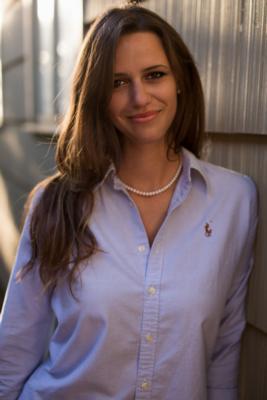
Leah Courtney
June 5, 2015
LI Grad Adapts to the Rise of Political Technology
Since 2008, the rise of technology in politics has turned elections into a whole new ball game, and no one knows this better than Rachel Kania. Rachel currently serves as the Senior Field and Technology Strategist for Rand Paul's presidential campaign. But she didn't just fall into the position. Rachel is a firm believer in starting at square one and working your way up the ladder. Rachel grew up in an apolitical household in Spring Hill, FL. Her passion for politics didn't come right away. In fact, it wasn't until 2007 that she became drawn to political philosophy and seeking out a candidate with strong principles. While perusing through YouTube videos, Rachel discovered Ron Paul and became inspired. After transferring to the University of South Florida, Rachel began finding other like-minded conservative activists inspired by the Texas Representative. Kania went on to serve with Students for Ron Paul and at Young Americans for Liberty (YAL). It was during her internship with YAL that Rachel was introduced to Leadership Institute (LI) trainings. Out of the many LI trainings she attended, she distinctly remembers what she learned from LI's Youth Leadership School and the Campaign Boot Camp, LI put together with YAL. “I still have my notes from those trainings and I reference them often,” Rachel said. The trainings provided Rachel with the knowledge to create a campaign budget, develop an effective staff structure, and how to build and spread the message. While describing her experience at LI, Rachel says, “What did I learn? More like, what did I not learn?” Kania says that the first place she sends activists is to a Youth Leadership School. When asked how LI has been helpful in her professional journey, Rachel responded with “connections.” Kania describes LI as a great networking tool and a “confidence booster.” She further explained that the Leadership institute helped her to find more activists like herself who were passionate about seeking the truth and electing principled conservatives. Following her time with YAL, Rachel was accepted into the Charles Koch Institute's intern program where she helped the Bill of Rights Institute create a student forum which reached out to and taught high school and college students about the Constitution. Since then, Rachel has served in top positions for Ron Paul's presidential campaign and for Ted Cruz's senatorial campaign. Rachel Kania is also responsible for creating Uproots Strategies, LLC, which provides field planning, digital strategy, and campaign management services. Uproots is responsible for putting the first two Republicans in history on Austin's city council. When asked what advice she would give potential leaders like herself, she said “Start from square one and climb… be flexible with your location and pay. Your experience gets your name out there.” She described her campaign experience as “building a business from the ground up.” “The biggest obstacle was going up against the establishment's big money and rallying activists,” Rachel said. But, the political world is “changing dramatically,” Rachel said. “Digital helps us access demographics we haven't reached before. Rand Paul's presidential campaign is already accommodating the evolution of politics by seeking out online volunteers to help their blogging and social media team. The campaign has even asked for volunteers to design their next t-shirt.” Rachel Kania predicts that the political world will keep evolving in the next 10-20 years due to the rise of technology. Please join LI in congratulating Rachel Kania for receiving LI's Conservative Leader Award. To nominate a Leadership Institute graduate or faculty member for the Conservative Leader Award or Conservative Leader-In-Training Award where they will have an article written about them, please contact LI's Director of External Affairs Carol Wehe, at Carol@LeadershipInstitute.org. The Leadership Institute offers over 44 types of training programs, working with more than 1,581 conservative campus groups, and helping employers connect with conservative jobseekers. Since the Institute's 1979 founding, more than 163,714 conservative activists, students, and leaders have been trained. Graduates include members of Congress, state legislators, local officials, media personalities, and conservative organization leaders. For more information, please visit: www.LeadershipInstitute.org
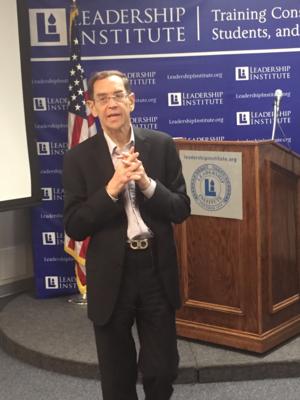
Jacob Weaver
May 29, 2015
Conservatives Learn to “Harness Legislative Hearings Effectively to Promote Their Principles”
Over the past two days, the Leadership Institute (LI) successfully completed the launch of its new Effective Legislative Hearing Training. “Liberals push their big government ideas using congressional hearings,” Morton Blackwell, the President of LI, stated in an email. “Conservatives must learn to harness legislative hearings effectively to promote their principles.”This new school adds to the already impressive diversity of LI's forty-four political trainings.Day 1Morton spoke during the introduction, asserting conservatives must learn the legislative hearing process and use it to their political advantage. Thirty-four people in the audience, made up of everyone from members of prominent think tanks to Capitol Hill staff, listened intently as Shant Boyajian from the Committee on Environment and Public Works presented an overview of the entire committee and hearing process. He finished by including all participants into a simulated legislative hearing, assigning character roles and pitting team against team.Katy Talento, a member of Sen. Thom Tillis's office, ended the night, energetically explaining how to prepare for a hearing on the Hill. Even at 9:30 p.m. on a Wednesday, she had everyone laughing throughout her presentation.Day 2The second day of LI's Effective Legislative Hearing Training brought the same excitement as the first.After a networking dinner, Neil Siefring of Hilltop Advocacy, LLC, began an energizing presentation on how to prepare a Member of Congress for a hearing. Neil stressed how legislative hearings allow each Member of Congress to: showcase expertise in the subject area, demonstrate understanding of current issues, and display active support for constituencies.Katy Talento then returned for her second night. With her usual energy, she taught the audience how to prepare witnesses and the difficulties a minority party faces. Katy brought her years of experience to life, revealing fantastic ‘tips and tricks of the game.'The night ended as Bruce Fein, a constitutional lawyer at Bruce Fein & Associates, Inc., held the class in awe with his vast knowledge of the constitutional issues that now plague America. He explained the importance of Congress checking the power of the executive branch, hearings being the primary way Congress achieves this goal. At the end of the training, all who participated left prepared to take on the challenge of a congressional hearing. The school equipped each student with a better understanding of the committee process, and ultimately fulfilled LI's mission to “increase the number and effectiveness of conservative activists and leaders in the public policy process.”>
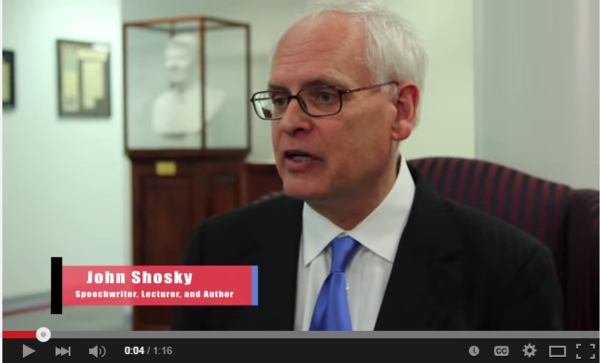
Joshua Gill
April 15, 2015
The Leadership Institute Continues the Reagan Revolution, Says Former White House Staffer
“People used to say to me, Morton Blackwell is the guy who will continue the Reagan Revolution and he's going to do it through the Leadership Institute.” That's what coworkers told John Shosky about Leadership Institute (LI) president, Morton Blackwell, years ago. John Shosky is the president of Roncalli Communications, a professional speech writer, trainer, and author of almost 3000 speeches for government officials, political candidates, and public interest advocates. John first heard of Morton Blackwell in 1988 while working in White House public affairs on a collection of President Reagan's accomplishments called The Reagan Record. “They began to tell me that before the administration started, Morton, who was a friend of Reagan's, was part of a loose pre-election kitchen cabinet that Reagan had,” Shosky said. “Morton had the idea – and Reagan thought it was a great idea – of trying to go beyond the 8 years of the administration and think about the future, and the future would be grassroots training for new generations of leaders, conservative leaders for the years to come.” Over the years, the Leadership Institute has trained 162,792 such leaders under the direction of Morton Blackwell, and through the generous donations of people who believe in investing in the future by training young conservatives. According to the numbers, and to John Shosky, the Leadership Institute has done just what people predicted years ago. He has kept the Reagan Revolution alive and well in young leaders across the United States. If you would like to know more about the Leadership Institute, hear more about the trainings and services LI offers, or want an opportunity to hear prominent conservative leaders speak publicly in support of what LI continues to accomplish, watch these videos featuring students and leaders LI has impacted. The Leadership Institute offers 44 types of training programs, working with more than 1,607 active conservative student groups, and helping employers connect with conservative jobseekers. Since the Institute's 1979 founding, more than 162,764 conservative activists, students, and leaders have been trained. Graduates include members of Congress, state legislators, local officials, media personalities, and conservative organization leaders. For more information, please visit: www.LeadershipInstitute.org.

Morton Blackwell
April 2, 2015
Do You Want to be a National Convention Delegate?
In early 1961, I decided to try to be a Goldwater delegate to the 1964 Republican National Convention. When Barry Goldwater beat the party establishment and won the G.O.P. Presidential nomination, I was his youngest elected delegate at San Francisco's Cow Palace. And I've been deeply involved in politics ever since. In 1975, I wrote an article for the Young Americans for Freedom magazine New Guard entitled, "So You Want To Go To A Convention?" Oklahoman Steve Antosh read the article and followed my advice. The next year, at age 19, Steve was elected a Reagan delegate to the 1976 G.O.P. national convention. Four years later, in 1980, Steve was the National Director of Youth for Reagan. For you, as for Steve Antosh and for me, conservative activism could be the route to the Big Convention and, perhaps, a career in the public-policy process. Hard Work Pays Off For Conservatives If you're a liberal Democrat, and you're a black lesbian militant with a Spanish surname, the Democrats' convention rules are written with quotas for you. If you are a conservative -- Democrat or Republican -- chances are you'll have to work hard to win a seat on your state's national convention delegation. Each state has its own rules for national convention delegate selection. States may and often do change their state laws and party rules between national conventions. Under their national rules and U. S. Supreme Court decisions, state Democratic parties may adopt rules for national convention delegate selection which are inconsistent with state laws. The national Rules of the Republican Party now also provide that state Republican Party rules for national delegate selection prevail over state law on this subject. Most delegates are elected in states with primaries, but primary and convention rules vary greatly from state to state. Learning your state's applicable laws and party rules is a key, first step toward becoming a delegate. If your state is one of those which have no presidential primary, you may have to mount a major operation to attract people to a caucus or win support from local delegates to a district or state convention. If you already know how to draw a crowd, work a convention, use parliamentary procedure, form alliances, and count votes, you have a head start on the road to the Big Convention. If your state elects delegates in a presidential primary, your problems will be somewhat different. A primary can involve precinct organization, TV, radio, social media, and press advertising, a great deal of money, and many more people than a convention. But while it helps to be an expert at convention politics and primary election politics, your personal reputation and your candidate preference are likely to prove much more important. Some states have "winner take all" presidential primaries. Other states use proportional representation. Under this system, presidential candidates who get a sizable minority of the primary votes may get some of the state's delegate votes. Rules for delegate apportionment for candidates in proportional primary states vary widely. In some primary states, delegates are elected by the party separately from the presidential primary. In these states, delegates are bound by the primary to vote at the national convention for the presidential candidate who wins the state's primary, for one or more ballots or until "released" by the candidate for whom they were obliged to vote. Neither state conventions nor primaries require the delegates to vote a certain way on other issues which may come before the national convention, such as credentials contests, the party platform, or proposed changes in the party's national rules. You can see how important it is to work hard to familiarize yourself with the rules which govern the delegate selection process in your state. In every state, whether delegates are selected by primaries or by conventions, the system is wide open at the bottom. Anyone can be a member of any party and participate in its delegate-selection process. You win if you get the most people to turn out for a primary, a caucus, or a convention. Building Your Base I began in early 1961 to consider the available routes in Louisiana to become a delegate to the 1964 G.O.P. nominating convention. There seemed to be only two sorts of people elected delegates to national conventions: those who had worked long and hard for the party over many years and those who had contributed substantial sums of money to the party and its candidates. Neither avenue was open to me. I had neither the time nor the funds to qualify. To develop a third route, I settled on youth politics. I helped organize Louisiana State University's YAF chapter in 1961. In 1962, I helped organize L.S.U.'s first College Republican Club and was the first elected College Republican state chairman for Louisiana. In 1963 and early 1964, I ran the youth campaign for Charlton Lyons, the Republican candidate for governor of Louisiana. Mr. Lyons won eight smashing, upset victories in college student mock elections, which raised my credit in the party. Later in the spring of 1964, I was elected state chairman of the Young Republicans. I wore out my old Rambler organizing youth activities across the state. Having worked closely with party leaders in all eight congressional districts, I became one of the handful of Republicans known to virtually every local leader who would be at the state convention. Senior party leaders were comfortable with me. I ran for national delegate with the simple slogan: "Elect one young person." The 1964 Louisiana Republican state convention elected four at-large delegates to the 1964 G.O.P. national convention: three well-off, veteran party activists and me. The Team Of course I would never have been a delegate if my presidential candidate, Barry Goldwater, had not been popular in the state party. In 1963, I was one of the original eight members of the Steering Committee of National Youth for Goldwater. I ran openly as a Goldwater supporter. This brings me to the central fact for aspirants to delegate slots: In a national presidential nomination contest, each candidate's district and state organizations may run slates of delegate candidates. If you are not slated by a candidate's organization, you are very unlikely to be elected a national delegate at a district or state convention or in a state primary. Occasionally, particularly in a convention state, a party senior statesman can be elected as an uncommitted delegate. Newcomer mugwumps (those who sit on the fence with their mug on one side and their "wump" on the other) go nowhere. Why might a candidate's state organization want you on their team? Here are some questions your candidate's organization will consider when you ask to be slated as a delegate or alternate delegate: Are you committed to our candidate? Are your commitments ever shaken by pressure, threats or bribes? Do you have personal supporters whose help would strengthen our candidate's entire slate of delegates? Will you be a hard-working campaigner for our slate of delegates? Are you sure to attend the national convention? Could you be useful to our candidate in winning more delegates to our side at the national convention? Do you have support and contacts in our candidate's national organization? Is there any likelihood you will say or do something foolish to damage our candidate? Is there anything in your background which would embarrass our candidate? Do we like you? If you are philosophically sound, technologically proficient, and movement oriented, you should pass muster on all these questions. Being a well-known volunteer leader would increase your chances of being slated by your candidate's organization. Alternatives May Work For You You don't have to be a delegate to go to a presidential nominating convention. An alternate delegate has all the rights and privileges a delegate has except voting. An alternate delegate may have a better time, because at contested conventions delegates are encouraged not to leave the convention floor even during dull speeches. In fact, you do not have to be either a delegate or an alternate delegate to have an impact on the events at a convention. When I was a Goldwater delegate in 1964, my major accomplishment was minor at the national convention in San Francisco. As a volunteer, I stuffed campaign envelopes for other delegates in the Goldwater mailroom. In 1968, as a Reagan alternate delegate, I was able to help convince a couple of uncommitted delegates to vote for Reagan. At the 1972 G.O.P. convention, I was neither delegate nor alternate. But I worked successfully with the conservative forces fighting against a well-organized, well-funded liberal attempt to change the national party rules governing delegate allocation and bonus delegates. A plan I drafted, which came to be known as the California Compromise (or the Briar Patch Plan), was adopted by the 1972 convention after a major, nationally televised, conservative vs. liberal fight. The principal speaker for our conservative plan was California Governor Ronald Reagan. Since 1972 that delegate allocation plan has withstood liberal challenges in court and at some subsequent G.O.P. national conventions. With few changes, it still is the basis for the allocation of delegates to the national convention. Since 1964, I've participated actively in each of the GOP national conventions, almost always as a delegate or alternate delegate but also, since 1988, as a member from Virginia of my party's national committee. The circumstances back in 1972, when I was not even an alternate delegate, permitted me to have what was probably my biggest impact to date on what went on at a presidential nominating convention. So don't miss a national convention just because you can't be a delegate. Start Now In politics you can start late, but you can never start too early. Maximize your effectiveness by joining your candidate's campaign organization as soon as you can. Call your candidate's office. Sign on early as an activist. The election process puts a premium on volunteer efforts. You should be welcomed with open arms. Your work for your candidate, not whether or not you are a delegate, will determine your position in your candidate's convention organization. The Big Convention comes only once every four years. It's too good an opportunity to miss. If you are serious about becoming a delegate or alternate, you should get a copy of your state party's rules from local or state party officials, or from your candidate's state or national organization. Conservatism is now politically fashionable. But few people will beg you to assume leadership. As historian Paul Johnson wrote, leadership, in its essence, is a combination of courage and judgment. If you plan carefully, work hard, and keep alert for good breaks, you may make a difference at a national convention. And you'll learn a lot.
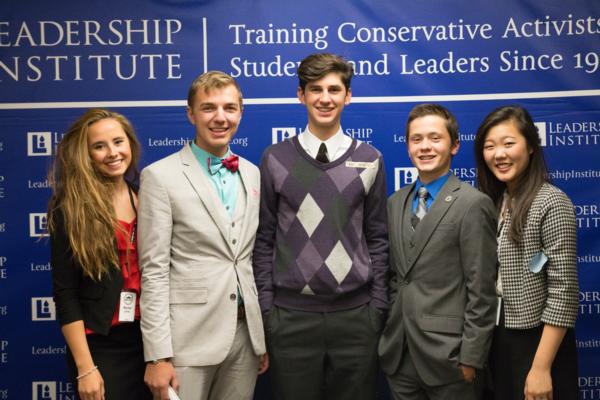
Elizabeth McCullough
March 31, 2015
Building the Young Conservative Movement
Leadership Institute partners with TeenPact to train Christian high school youth Seventy dedicated Christian youth aged 14-19 spent five days at the Leadership Institute to train for a lifetime of activism and leadership. With a strong commitment to advancing faith and freedom through community and civic engagement, these students came from 41 states for their annual adventure known as ‘Back to DC' – a program run by TeenPact. Founded in 1994 and based out of Richmond, Virginia, TeenPact is a dynamic, hands-on leadership school for Christian students. TeenPact works to train youth to understand the political process, value their liberty, defend their Christian faith, and engage the culture. The Leadership Institute has partnered with TeenPact for 19 years to help these students achieve those goals. Five intense days of training at the Leadership Institute During the five-day program in October, experienced Leadership Institute faculty taught students political lessons, including: The Real Nature of Politics Campaign Structure and Organization Developing Effective Speeches and Literature Voter Outreach Media and Public Relations “Every year, this is the only group of students that intimidates me,” said Steven Sutton, the Leadership Institute's Vice President of Development. “They're razor sharp and brilliant.” After addressing the group, Steven asked if there were any questions – nearly every hand in the room went up. “Each student showed a level of maturity and intellect well beyond their years,” said Steven. “They process information quickly, add context from their personal experiences, and extrapolate to the next level. You can practically see their brains growing right in front of you.” TeenPact's training program also included several visits to Washington, D.C., to meet with members of Congress and visit the institutions that comprise America's constitutional government. Turning campaign knowledge into experience Students participated in campaign exercises where they applied their political lessons to run mock presidential campaigns – complete with press conferences, letters to the editor, and targeted voter outreach. The culminating activity was a presidential debate where each team uniquely and creatively put their theories into practice. Five Leadership Institute and TeenPact judges rated six teams based on performance in all areas of their campaigns. Outstanding young graduates win elections Several outstanding Leadership Institute graduates got their start through TeenPact, including: Jessica Koehler – After an internship and several trainings with the Leadership Institute, Jessica went home to manage her father's campaign – and propelled him to election victory to the Ohio House of Representatives this past November. Jennifer Sullivan – This 23-year-old took the Leadership Institute's Youth Leadership School and learned how to organize volunteers for campaign victory. Jennifer is now the youngest woman ever elected as a state representative in Florida. Youth already putting their training into practice TeenPact students filled the Leadership Institute's classroom with energy, enthusiasm, and determination to make a difference – ready to apply their training in their communities. “I learned so much this week and I'm really motivated to become more active in my state's government,” said Rachel Bass. “I've already started helping on my lieutenant governor's campaign for re-election in 2016. I wouldn't have gotten involved in the campaign if it hadn't been for TeenPact and all the Leadership Institute speakers we heard from.” Donor support makes this exceptional teenage training possible and allows the Leadership Institute to cultivate conservatism in teens before they meet with the onslaught of liberal bias and indoctrination on college campuses. The Leadership Institute offers 44 types of training programs, working with more than 1,602 active conservative student groups, and helping employers connect with conservative jobseekers. Since the Institute's 1979 founding, more than 162,508 conservative activists, students, and leaders have been trained. Graduates include members of Congress, state legislators, local officials, media personalities, and conservative organization leaders. For more information, please visit: www.LeadershipInstitute.org.
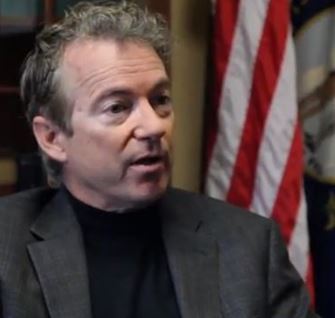
Joshua Gill
March 20, 2015
Rand Paul: Leadership Institute Trains the Next Generation
If you've ever wondered how effective Leadership Institute trainings are when it comes to the working world of politics, go ask Kentucky Senator Rand Paul. Better yet, watch and listen from the comfort of your own home as Sen. Rand Paul shares his thoughts on the Leadership Institute and on LI's founder and president, Morton Blackwell.“In our office we actually have 6 of our staff who have come out of the Leadership Institute,” said Senator Rand Paul. “My former chief of staff was actually with the Leadership Institute and worked closely with them for many years.”The goal of the Leadership Institute is to effectively train young conservative activists to be leaders in our nation's government. Sen. Rand Paul says LI is doing just that.“I think what's great about the Leadership Institute is that it does something really no one else is doing…. There's really nobody [else] training the next generation of people who will be the leadership of our country,” said Sen. Rand Paul. “To me it's an amazing thing and it is genius for Morton Blackwell to come up with the idea.”Sen. Rand Paul first crossed paths with Morton at the Republican National Convention of 1976 when Morton was a Reagan delegate. This was during the time of the Rockefeller Republicans, before Bush. In essence, Morton was a Reagan Republican before it was cool and remained steadfastly so during President Reagan's political career.That was only part of Morton's ongoing efforts in the conservative movement, and Sen. Rand Paul said such a career speaks to the value of Morton's political work and experience.“Morton Blackwell's legacy will be [as] someone who has been there from the very beginning and really was one of the originators who created the conservative movement,” Sen. Rand Paul said.If you would like to know more about the Leadership Institute, experience the trainings and services it has to offer, or want an opportunity to hear Sen. Rand Paul and many other prominent conservative leaders speak publicly in support of what LI continues to accomplish, watch these videos. They feature Senator Ted Cruz, former liberal student Jesus Rodriguez, young conservative Gabrielle Jackson, LI faculty Ian Ivey, and many more conservatives making a difference for the future.The Leadership Institute offers 44 types of training programs, working with more than 1,591 active conservative student groups, and helping employers connect with conservative jobseekers. Since the Institute's 1979 founding, more than 162,508 conservative activists, students, and leaders have been trained. Graduates include members of Congress, state legislators, local officials, media personalities, and conservative organization leaders. For more information, please visit: www.LeadershipInstitute.org. >
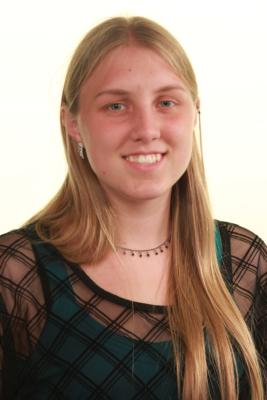
Joshua Gill
March 19, 2015
Student Speaks Out for Concealed Carry on Her Indiana Campus
From Campus Reform to the New York Times, Leadership Institute graduates are letting freedom ring in the media and making a difference throughout our country.Former Leadership Institute intern and Indiana University Senior Crayle Vanest, who became the first woman on the board of the lobbying group Students for Concealed Carry, caught The New York Times limelight Wednesday, February 18 speaking out on two explosive college campus issues that have people fired up around the nation. The New York Times' article “A Bid for Guns on Campuses to Deter Rape” reports Crayle “said she should be able to carry her licensed .38-caliber Bersa Thunder pistol on campus, where she said she had walked unarmed after her late-night shifts at a library food court.”The article also quotes Crayle linking the issue of gun rights to the issue of campus safety and sexual assault.“‘Universities are under a ton of investigation for how they handle sexual assaults — that shows how safe campus maybe isn't,' said Ms. Vanest, who is lobbying Indiana lawmakers. ‘Our female membership has increased massively. People who weren't listening before are listening now.'”Conservative leaders like Crayle Vanest and Larry Pratt, LI faculty and executive director of Gun Owners of America, have helped put the prospect of concealed carry on college campuses and more expansive gun rights at the forefront of the national consciousness. They have done so amidst an ocean of controversy and liberal backlash.The campaign for constitutional gun rights is a fight that has gone on for years in the arena of public opinion. The issue of sexual assault against women, reinvigorated by the Rolling Stone story “A Rape On Campus,” puts a new perspective on the issue. In the face of threats like deranged shooters and sexual predators, conservatives like Crayle say students, especially women, should have a decisive means of defense.LI's Campus Reform has often reported on campus gun rights, the issue of sexual assault on campus, and other issues that affect the rights and wellbeing of college students across the country.The Leadership Institute boasts a long line of graduates like Crayle who have gained public attention in support of hot button issues and candidates. LI is committed to training conservative leaders like Crayle, giving them the skills and tools to make their voices heard, and shining the spotlight on important issues concerning the rights of college students through Campus Reform.The Leadership Institute offers 44 types of training programs, working with more than 1,591 active conservative student groups, and helping employers connect with conservative jobseekers. Since the Institute's 1979 founding, more than 162,508 conservative activists, students, and leaders have been trained. Graduates include members of Congress, state legislators, local officials, media personalities, and conservative organization leaders. For more information, please visit: www.LeadershipInstitute.org. >

Joshua Gill
February 25, 2015
Multi-State American Girl – Soldier, World Traveler, Writer
Though she calls South Carolina home, Samantha Bonsack – soldier, world traveler, and writer – will be the first to tell you she is a Multi-State American Girl. She recently added Iowa to her repertoire of states due to her new job as Congressional Staff Assistant to Rep. Rod Blum. Samantha, though forging ahead in her political career, came relatively recently to the working world of politics. After a life of military service, and several other jobs that took her across the country and around the world, Samantha sought a new direction in life. “I began to question the direction of my life,” Samantha said. “I had one job and I was lucky if I got 18 hours! I was pretty bad off at 31 with a degree and a 10 year military background but no open doors.” Samantha said the Leadership Institute (LI) helped her open a door where at first it seemed there were only walls. “I had done an over the phone resume consultation with the Leadership Institute that helped me a lot with condensing my four page federal resume down to two,” said Samantha. “They strongly urged that I join a campaign to help me gain political experience, which I had never thought of doing.” In addition to the phone consultation with LI's Conservative Jobs, Samantha also attended LI's Capitol Hill Jobs seminar. Samantha credits the training she received in that seminar with helping her land her start in her political career. “If I had not gone to that seminar I wouldn't be where I am today, and I am so thankful for LI and the seminars they offer,” Samantha said. “At the very least, you can do a lot of networking at those events.” After Samantha's phone consultation with LI, Samantha said she was drawn to Representative Rod Blum's campaign because of their shared political values. Looking back, Samantha says she chose well. “Through personal connections with people I had met through meetings and events I learned about Congressman Blum and loved what he stood for and his principles and wanted to help him win because I felt that Congress needed more people like Rod to get things right in our country,” Samantha said. “I flew out to Iowa and canvassed the first district all day sometimes into the night and all of the team's hard work paid off because we won a primarily democratic district. One of the best and fun experiences I have had. I would definitely do it again.” Before Samantha's foray into politics she served in the munitions field of the U.S. Air Force for 10 years and was the first female in her family to join the military. Samantha's military career took her across the world. She was stationed in California, South Korea, England, and Texas, and deployed twice to Afghanistan. Samantha thrived in the military. Noble as her military career was, though, Samantha realized she wasn't fulfilling her life's passion. “I separated from active duty for two reasons,” Samantha said. “One, I wanted to go to school full time and pursue my dream job. Two, I couldn't be politically active being active duty military.” After ending her active military career, Samantha enrolled in McMurry University in Abilene, TX where she earned a BA in political science. Samantha then took a DOD contracting job in Qatar for 14 months starting in 2013. Politics, however, was a passion that stayed with Samantha throughout her life – a fact borne out not only by her current political career, but also by her career as a writer for a small town newspaper in Texas. Starting in 2011, Samantha wrote political opinion articles for the paper and continued through 2015. “Writing my political opinion (fact) articles is a passion on mine,” Samantha said. “I love writing and I love politics.” Samantha said her passion for politics began as a result of growing up in a politically aware family. “I kind of always laugh when asked, ‘why politics' and I explain to people that I am a ‘Rush baby,' that's why,” Samantha said. “My parents have talked politics since I was a little girl and I remember driving around San Diego, California with my mom and her ALWAYS listening to Rush Limbaugh.” Even though Samantha no longer actively serves in the military, she said she hopes to continue to serve her fellow service members through her political career. “I'm hoping that I can make a positive impact on the constituents in the first district and that they know they can fully rely on Congressman Blum to put their needs and concerns first,” Samantha said. “I also hope that I can contribute to legislation for veterans. I love my veterans, being one myself, and I would love to make suggestions to not only help veterans in Iowa, but all over the US. Someone needs to look out for them and I want to be that person.” In addition to serving the people of Iowa and helping veterans across the nation, Samantha has big plans for the future. “I plan to pursue my Master's degree in Foreign Relations and eventually find a PhD program to complete my long time goal of gaining the highest level of education that anyone in my family has achieved.” The Leadership Institute is committed to training and equipping leaders like Samantha. Please congratulate Samantha Bonsack on being nominated for LI's Conservative Leader-In-Training Award. To nominate a Leadership Institute graduate or faculty member for the Conservative Leader Award or Conservative Leader-In-Training Award, please contact LI's Director of External Affairs Carol Wehe, at Carol@LeadershipInstitute.org. The Leadership Institute offers over 44 types of training programs, working with more than 1,576 active conservative student groups, and helping employers connect with conservative jobseekers. Since the Institute's 1979 founding, more than 161,460 conservative activists, students, and leaders have been trained. Graduates include members of Congress, state legislators, local officials, media personalities, and conservative organization leaders. For more information, please visit: www.LeadershipInstitute.org.

David Fenner
February 16, 2015
Conservative Intern Workshop Canceled.
Due to travel and safety concerns, the Tuesday, February 17, 2015, Conservative Intern Workshop has been canceled. This workshop will be rescheduled later this semester.